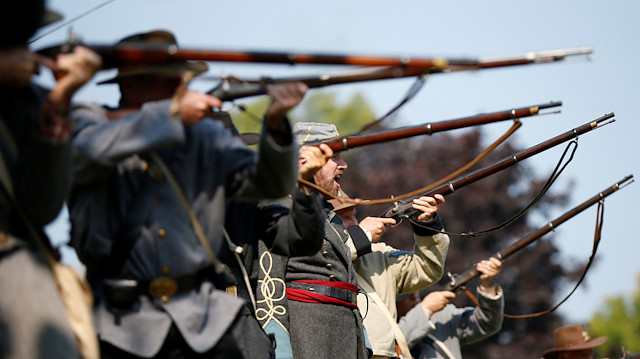
POLITICAL VIOLENCE
While there is no evidence that radical groups on the right or left are organizing a military campaign to plunge the country into civil war, a number of attacks in recent years have raised concerns about a surge in political violence.
A woman was killed when a white nationalist plowed his car into a crowd of counter-protesters at a rally of right-wing extremists in Charlottesville, Virginia, in 2017.
In August, a suspected white nationalist shot dead 22 people at a Walmart store in El Paso, Texas, shortly after posting an anti-Hispanic manifesto online.
Violent rhetoric about an impending civil war is on the rise, said J.J. MacNab, a fellow specializing in anti-government extremism at George Washington University's Program on Extremism. "It used to be just the militia guys saying this stuff, and now it's gone totally mainstream," she said.
She pointed to a YouTube video posted in June that drew 1.4 million views. The video detailed how the electrical grid in "major leftist cities" could be taken down, and concluded that another civil war was inevitable and would be won by the right wing.
Georgetown University's Institute of Politics and Public Service this month released a poll that found a majority of Americans think political, racial, and class divisions are worsening, and that the average voter believes the United States is two-thirds of the way to the edge of a civil war.
Trump's supporters at the Cedar Creek reenactment said Democratic opposition to the president had inflamed old rifts in U.S. society and pushed some to extreme positions.
"You got some Sons of Confederate Veterans members that would start shooting tomorrow," said Jake Jennette, 79, a reenactor portraying General Lee.
He and his friend Wayne Newnam, who represented Lee's lieutenant general Jubal Early, said they used to be part of the group but left because they didn't like the violent turn that some members had taken.
Dave Clarke, who manned a table distributing Sons of Confederate Veterans literature and merchandise at the reenactment, said violent white supremacists had misappropriated the Confederate flag, and that he had faith in the U.S. system of government to resolve differences peacefully.
"There's probably people here who've got AK-47s in their trunks but that's not the answer. We've been there and done that. That's not the way," Jennette said, tears coming to his eyes as he recalled his own military service in Vietnam and his son's tour in Afghanistan.
He too supports Trump and believes the best way to avoid a war would be the "total annihilation of the liberals" at the ballot box when Trump seeks a second four-year term in the 2020 election.
Newnam, 70, said he thought the United States had healed from the Civil War by the 1920s but is "regressing" to a state of polarization. He mainly blamed liberal resistance to Trump for the divide, but acknowledged that some of Trump's tweets have not helped.
"The resentment was already there, and it's easy to drum it up again," said Newnam. "Social media has allowed people to be nasty to other people without having to face them. Maybe the Trumpster has brought that out a little. God knows some mornings I wish he'd sleep a little later," he added, chuckling.


